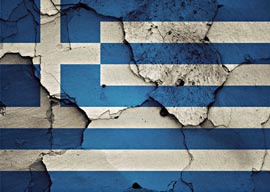
July 09, 2015

Source: Shutterstock
Back in the good old days of 2,500 years ago, the Greeks blamed the gods for their self-induced disasters. In modern times the Brits were to blame and then the Americans. Now it’s the Germans. Modern Greeks are not renowned for introspection. Others are always responsible. We brag about inventing democracy”however selective”and also about inventing tragedy, as in Aeschlyus and Euripides, but don”t dwell at all on another word we invented: demagoguery. Demagoguery is what brought Alexis Tsipras and his motley crew of corner-café pseudo-philosophers to power, and demagoguery continues to dominate Greek political discussions even today as we await our fate from Europe’s unelected elite. But let’s not forget comedy, yet another Greek invention. Last Sunday’s referendum was truly Greek, a tragicomedy of errors, a yes-or-no question drafted in cryptic, technocratic gobbledygook, worthy of the best Brussels newspeak. But let’s start at the beginning.
The Greek ship of state was cruising on choppy waters under a benign monarchy headed by the 23-year-old King Constantine back in 1967. Greeks are known for their hot tempers, and they were never hotter than during the spring of 1967. MPs regularly came to blows in Parliament as elections loomed. On April 21, 1967, a military coup took place, one that the king was forced to accept in order to avoid bloodshed. After six months the king attempted a countercoup to restore democracy, but he failed, choosing exile instead. The colonels collapsed in the summer of 1974 when Turkey invaded and occupied the northern part of Cyprus. Democracy was restored, and the king was rejected in a plebiscite reminiscent of the kind perfected by South American strongmen. Thus begins Greece’s latest democratic period.
Two men dominate the post-colonel period: Constantine Karamanlis and Andreas Papandreou. Both men started their own political parties, New Democracy for the former, PASOK for the latter. Karamanlis was center-right, Papandreou center-left. Both got very rich in office, and both corrupted the patronage system to the maximum. Then Karamanlis, a man I knew very well, and one who had benefited from my father’s largesse only to turn against him once he was no longer needed, had a brilliant idea. He proposed to the powers of the EEC, as it was then called, to allow Greece to join the then six nations, thus ensuring no ambitious colonel would try to grab power by force of arms. The EEC welcomed us with open arms. European money began to flow into a poor country whose main exports were olives and fruit and whose economy was based on tourism and shipping.
In 1981, the established EU Greek nation decided to swing left. Andreas Papandreou came into office and a real Greek upheaval took place. Papandreou established a core constituency of voters by enriching them for life. The trick was an easy one. Tony Blair tried it years later. Close to 25 percent of Greeks were employed by the state, with pensions worthy of far, far richer nations, and leaders of civil unions enjoying double or triple pensions for retiring at age 50. With 25 percent of the electorate in his pocket for life, Papandreou then proceeded to nationalize industries, milk the EU treasury, and flirt with Middle Eastern dictators. He personally became very rich, and even divorced his American wife for a very generously endowed airline hostess he met while flying to an EU meeting who went by the nickname Mimi Big Tits. He married Mimi, survived all sorts of riots against his corrupt policies, and finally expired, his face buried in Mimi’s bosom. After his demise she became a nonperson, as in Stalinist societies. Both Karamanlis and Papandreou were succeeded by their nephew and son, respectively, becoming prime ministers”which illustrates a certain lack of imagination on the part of a battered electorate. Then came the 2004 Athens Olympics and the crowning of Greece as a rich, modern European nation covered in glory. The Greek state spent like there was no tomorrow. And, as it turned out, there was not.
Throughout the early years of the new millennium, the Karamanlis-Papandreou cliques had a new party trick up their sleeves. They played musical chairs for the premiership and were advised on how to cook the books by Goldman Sachs at 300 million greenbacks a shot. It was worth it. EU funds kept pouring in, while Greeks enjoyed avoiding taxes and going to the beach. But a word about tax avoidance: The omnipotent state created by Karamanlis and Papandreou gave back very little to hardworking Greeks who did not rely on the state for their welfare. Hospitals are poorly run and dirty, city planning almost nonexistent, and garbage collection a hit-or-miss affair. In other words, there is very little in return for paying one’s taxes.